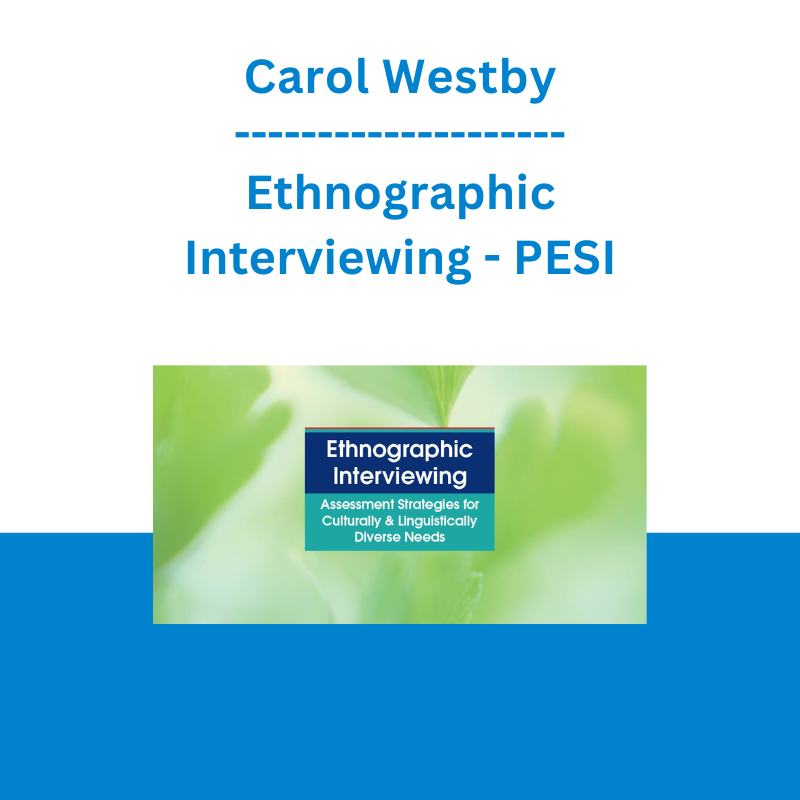*** Proof of Product ***
Exploring the Essential Features of “Carol Westby – Ethnographic Interviewing: Assessment Strategies for Culturally & Linguistically Diverse Needs – PESI”
Speaker: Carol Westby, PhD, CCC-SLP, BCS-CL, ASDCS
Media Type: Digital Seminar
Description
How do you know if you’re asking the right questions, to elicit the most pertinent information?
As clinicians, you must not only understand your clients’ impairment/disability but also see the world through their eyes.
In this recording, Dr. Carol Westby will explain how information gained through ethnographic interviewing – asking the right questions to the right person in the right way – can enable you to design assessments and interventions to meet your clients’ needs and goals.
You will learn how to conduct an ethnographic interview and analyze the information gained to:
- Identify barriers to client’s participation
- Convey respect
- Promote reciprocity
- Encourage responsiveness to the clients’ or families’ perspective
Ethnographic interviews can be used with all clients and their families and are critical when you don’t share their cultural/linguistic background. Video demonstrations are woven throughout the presentation to show the types of questions/interactions.
Speaker
Carol Westby, PhD, CCC-SLP, BCS-CL, ASDCS, is an internationally-renowned expert on play assessment and development in children. She is the developer of the renowned Westby Symbolic Play Scale, a research-based scale used to assess children’s social and play skills. Dr. Westby has written and implemented projects to support personnel preparation, clinical service, and research, including Project PLAY (Play and Language Attunement in Young Children), that trains caregivers to increase the development of play, theory of mind, and language.
Dr. Westby is a fellow of the American Speech-Language-Hearing Association (ASHA), is Board-Certified in Child Language and Literacy Disorders, and has received the Distinguished Alumnus Award from Geneva College and the University of Iowa’s Department of Speech Pathology and Audiology, the ASHA Award for Contributions to Multicultural Affairs, the Honors of ASHA, and the Kleffner Lifetime Clinical Career Award.
Dr. Westby has published and presented nationally and internationally on topics including play, autobiographical memory, theory of mind, language-literacy relationships, narrative/expository development and facilitation, adverse childhood experiences, screen time, trauma, metacognition/executive function, and assessment and intervention with culturally/linguistically diverse populations. She has consulted with the New Mexico Preschool for the Deaf, which employs a play-based curriculum.
Dr. Westby has been a visiting professor at Flinders University in South Australia where she worked on a language/literacy curriculum, and at Brigham Young University where she consulted on SEEL, a systematic and engaging emergent literacy program that employs playful practice. She is a consultant for Bilingual Multicultural Services in Albuquerque, NM and holds an affiliated appointment in communication disorders at Brigham Young University in Provo, UT. Dr. Westby is certified as an Autism Spectrum Disorder Clinical Specialist (ASDCS).
Speaker Disclosures:
Financial: Carol Westby has employment relationships with Brigham Young University and Bilingual Multicultural Services. She receives a speaking honorarium and recording royalties from PESI, Inc. She has no relevant financial relationships with ineligible organizations.
Non-financial: Carol Westby is a board member of the American Board of Child Language and Language Disorders.
Objectives
Participants will be able to:
- Assess the role of ethnographic interviewing in evidence-based practice and the International Classification of Functioning.
- Conduct an ethnographic interview to inform the clinician’s choice of treatment.
- Analyze interview data to establish intervention goals and objectives to improve client engagement.
Outline
Foundations for Clinical Assessment and Intervention
- Evidence-based practice (EBP) framework
- International Classification of Functioning framework
Ethnographic Question Types – Asking the Right Question in the Right Way
- Descriptive questions to help clients describe experiences, daily activities, objects, and people
Grand tour and mini tour
Example, experience, and native language - Structural questions to determine relationships among ideas
Building Rapport
- Stages of rapport
- Problematic questions
- Questioning that facilitates rapport
Social Dimensions
- What they are
- Why to identify
Analyzing the Interview Data
- Domain analysis
Identifying barriers and facilitators
Determining strengths and needs - Setting goals and objectives
Video demonstrations are woven throughout presentation to show the types questions/interactions
Target Audience
- Case Managers
- Nurses
- Occupational Therapists
- Physical Therapists
- Psychologists
- School Administrators
- Social Workers
- Speech-Language Pathologists
Please see the full list of alternative group-buy courses available here: https://lunacourse.com/shop/










 The Daily Traders – Exclusive Trading Mentorship Group
The Daily Traders – Exclusive Trading Mentorship Group  Jesse Livermore Trading System - Joe Marwood
Jesse Livermore Trading System - Joe Marwood  Racing Workshop - Complete Online Package
Racing Workshop - Complete Online Package  Money Miracle - George Angell - Use Other Peoples Money To Make You Rich
Money Miracle - George Angell - Use Other Peoples Money To Make You Rich